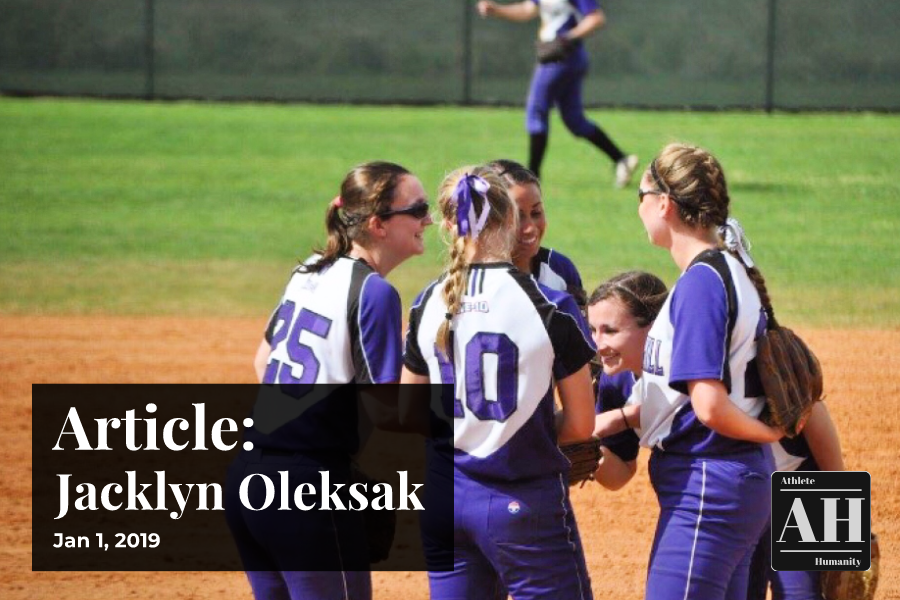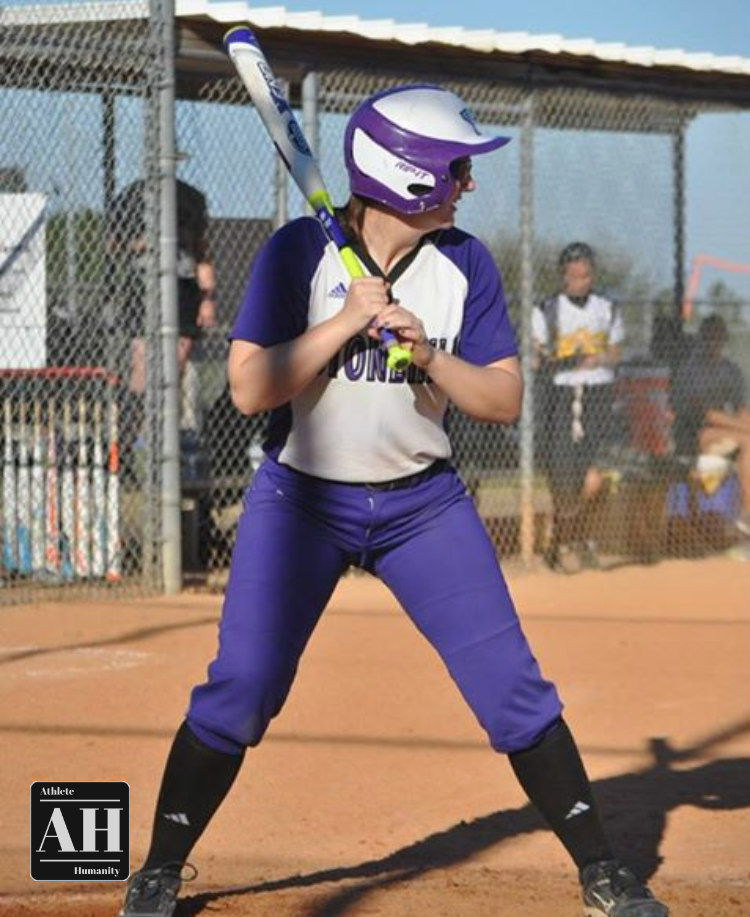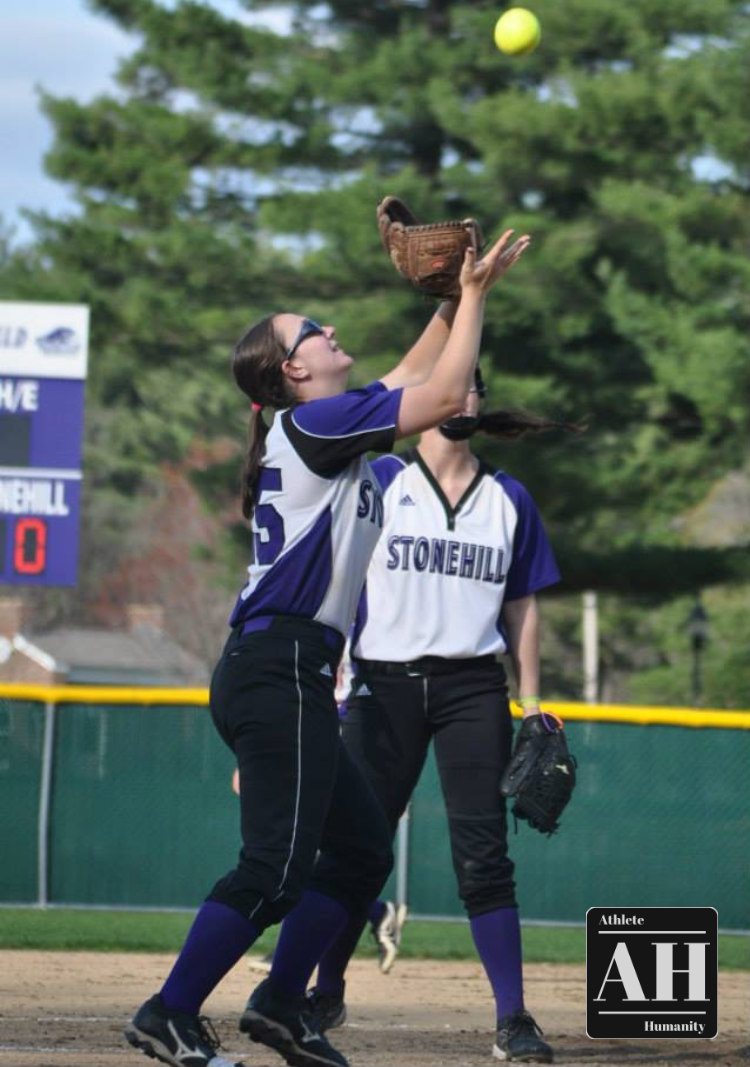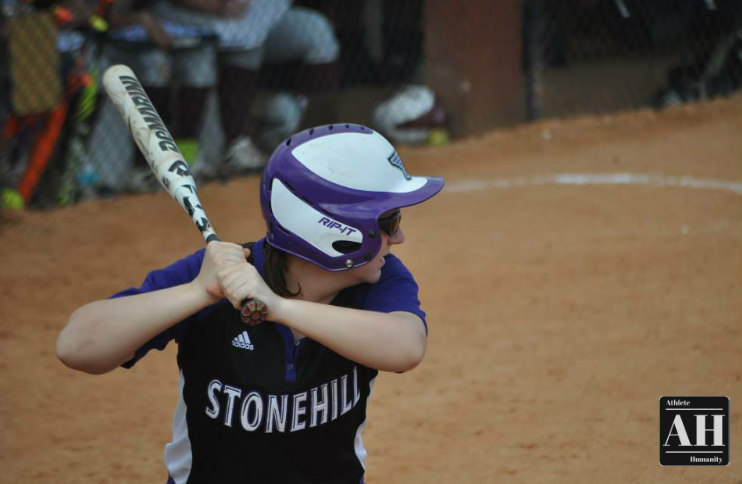Jacklyn Oleksak
January 1, 2019 — Jacklyn Oleksak
Jacklyn Oleksak
Growing up, my life seemed very “normal.” In fact, it was better than normal. I had many opportunities in school and especially when it came to sports. I succeeded in being a three-sport athlete in high school and was fortunate to have the opportunity to continue playing softball at the NCAA Division II level. Everything felt right; everything was right.
My freshman year of college was full of meeting new people, new experiences and new challenges; all of which I conquered with fierce determination and the drive to succeed. Coming into college I very well knew that I would most likely not touch the field much as a freshman since the team had a senior third baseman with a very successful career. While this may have been a challenge for some, it was a situation I accepted completely and it even gave me the opportunity to learn from someone who has been doing this for four years. A day didn’t go by during my freshman year of college where I did not think about how perfect my college experience had been so far. I had made incredible friends, had amazing opportunities, and of course I had the chance to experience playing the sport I love so much at an extremely competitive level. My freshman year seemed like something out of a fairytale; and indeed, it was.
Perhaps this fairytale was too good to be true. Days before beginning my sophomore year I got the horrible news that my very best friend and soon-to-be roommate had died by suicide. I was sent into a whirlwind, as I have never experienced anything like this before. How could my best friend do this? Why did she do this? What could I have done? The feeling was, and in fact still is unreal to me. Overtime I have learned that we all experience trauma differently, but at the time this was not something I knew. I went from a normal and happy 19-year-old college athlete to someone experiencing a serious trauma – not something myself or others were prepared to handle. However, as with other challenges I have faced I decided to do my best to handle this with grace and the drive to persevere. I began to miss the normalcy of my life before college.
The truth is, that year I seemingly did very well, and I thought I was handling this situation with grace. I succeeded in my classes and became the starting third basemen and hit above .300 that season. I often was met with comments about how well I was doing despite my situation and I was always made aware by my teammates, friends, family and coaches that I was not alone in this and that everyone would be there every step of the way. But none of this was the case. Every single day was a constant struggle, I felt completely empty on the inside and I spent many days and nights alone in my half empty room where my best friend and roommate was supposed to be with me. I disassociated from the situation completely which allowed for the illusion that I was doing well to be visible to others, meanwhile I felt as though I was completely numb and not myself anymore. While I had people by my side especially in the beginning of this journey, after a few weeks and months, the constant help and support of others began to fade; however, the grief I was dealing with did not fade, and instead intensified. I cannot blame others for this as it is not a fault of their own, but simply how life seems to work. As time went on my grief, confusion and personal despair grew stronger, but I felt more alone. Trying to balance tough academic schedules and division II athletics is a challenge in itself; by adding a serious trauma to the mix I found myself to be in trouble.
Following my sophomore into my junior year I began to have thoughts that had intensified quickly, which I understood to be depression. Despite pretty clearly understanding what was going on, I felt like I was in a haze, paralyzed by my thoughts, and I had an extremely difficult time seeking help. It was not until teammates of mine helped me make my first appointment to receive therapy once a week at my school. I felt shame that this was not something I could “overcome,” despite learning in therapy that this was not something one should or will overcome. I mean, I can take a fastball to the gut and persevere through a shoulder injury, why couldn’t I deal with some thoughts in my head? Why couldn’t I overcome that? Eventually my battle with crippling anxiety and major depressive disorder really started to take a toll on my relationships with friends and teammates, my academic performance, my goals and aspirations, as well as physically taking a toll. I felt as though I was completely isolated, that no one cared about me and that this was a battle I would have to fight alone, knowing well that this was a battle one cannot fight alone. This was a fight that could not be fought in the environment I was in. I had begun to turn to unhealthy ways of coping with stress and everyday was a battle in my head that I could not seem to win; a battle I no longer bothered to fight. I had essentially given up.
Unfortunately, my mental illness caused me to leave softball, my team and coaches, and the school I loved during my senior year to take care of my mental health. Through my recovery journey, I have met many people sharing similar experiences as college athletes. I now know I am not the only player from my conference, from my sport or from my very own team who was dealing with serious mental health issues.
The stigma surrounding college athletes when it comes to dealing with mental health is horrible, to make it blunt. Being a college athlete, I have realized that I am automatically held to a higher standard by everyone I meet. I am not supposed to struggle and I am expected to excel in all aspects of my life. While it may sound insane, the culture really is like this. It seemed as though every athlete in college was “good-looking”, smart, popular and of course talented in their sport. Our lives seemed perfect. But this is so far from the truth, there are so many college athletes struggling, in fact, 1/3 of female college athletes struggle with their mental health at some point; but no one talks about it! Though talking about it may be uncomfortable and scary, it allows for personal healing as well as communal understanding that college athletes aren’t perfect and even may be predisposed to dealing with mental health issues due to the stigma surrounding mental health in college athletics. I know that by sharing my experiences I can give even a small sense of comfort to those that are currently struggling, so just imagine what can be done by more and more people sharing their stories. Perhaps the stigma surrounding collegeathletes and mental health, and just mental health in general can be shattered; so that we don’t lose anyone else to suicide like I did my best friend. The truth is that talking about it allows us to be something bigger than our sports may ever allow us to be. We get to be advocates, we get to be game-changers and most of all we get to aid in shaping the future of what college athletics will look like in years to come.




